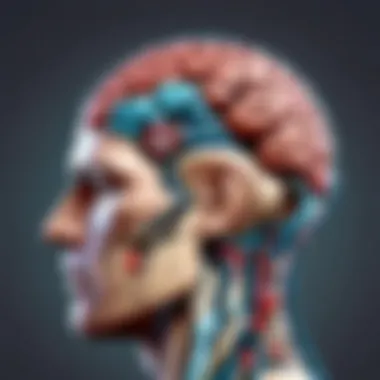Unlocking the Cognitive Potential: How Gaming Influences Cognitive Development


Game Overview
In today's digital age, the realm of gaming stands at the forefront of cognitive development discussions. One such prominent game elevating cognitive skills is Valorant, a popular first-person shooter (FPS) game developed by Riot Games. Valorant is celebrated for its strategic gameplay embedded in a tactical shooter environment. As players immerse themselves in Valorant's intricacies, they are challenged to enhance various cognitive abilities, making it a compelling subject for exploring the impact of gaming on cognitive development.
Introduction to Valorant
Valorant introduces players to a world where precise aim, strategic thinking, and quick decision-making are pivotal. Set in a near-future Earth, players assume the roles of 'agents' equipped with unique abilities, each serving distinct roles within the team. This diverse cast of characters adds layers of complexity to gameplay, requiring players to adapt and strategize based on their agent selection and team composition.
Game Mechanics and Objectives
In Valorant, two teams, attackers and defenders, compete in rounds to achieve their objectives. The attacking team aims to plant a 'spike' at designated sites, while the defending team strives to thwart these efforts. Success hinges on a blend of precise aim, map awareness, ability usage, and team coordination. Mastering these mechanics is essential for players to progress and outsmart their opponents.
Brief History of the Game
Riot Games released Valorant in June 2020, drawing inspiration from classic FPS games while infusing innovative gameplay elements. The development team focused on creating a balanced and competitive environment, attracting players seeking a blend of tactical depth and mechanical skill. Since its launch, Valorant has garnered a dedicated player base and emerged as a prominent title in the esports scene.
Subsection: List of Playable Agents and Their Unique Abilities
Valorant features a diverse roster of agents, each with a set of unique abilities that complement their playstyle. From duelists specializing in aggressive engagements to initiators facilitating team pushes, players can choose agents that align with their preferences and strengths. Understanding agent abilities and mastering their use is crucial for excelling in Valorant's dynamic gameplay.
Introduction
In the vast landscape of cognitive development, the impact of playing games stands as a captivating subject of exploration. How do digital worlds and strategic challenges mold our minds, and to what extent do they influence our cognitive faculties? This article ventures into the depths of correlating gaming with cognitive prowess, aiming to unravel the intricate interplay between virtual engagements and mental acuities. By delving into the cognitive benefits unearthed by gaming, we aim to shed light on the transformative potential of this leisurely pursuit.
Defining the Relationship
The concept of cognitive development
Embarking on a journey to dissect the concept of cognitive development unveils a realm dedicated to the evolution of human mental capacities. It centers on the progression of cognitive functions, encompassing memory, attention, problem-solving, and decision-making abilities. Within the scope of this discourse, cognitive development serves as the cornerstone upon which gaming's impact is appraised. Its critical role in shaping human intellect provides a poignant backdrop against which we analyze the effects of gaming on cognitive fortitude.


The role of gaming in cognitive enhancement
The alignment of gaming with cognitive enhancement heralds a new era of interactive stimulus for mental acuity. Gaming transcends mere entertainment, offering a dynamic platform for cognitive feats to flourish. It engages players in strategic thinking, rapid decision formulation, and adaptive problem-solving, all of which synergize to bolster cognitive capacities. By amalgamating recreational engagement with cognitive challenges, gaming emerges as a pivotal catalyst for augmenting mental dexterity and acumen.
Purpose of the Study
Understanding the benefits of gaming on cognition
At the crux of our investigation lies the profound endeavor to comprehend the multifaceted advantages gaming bestows upon cognitive domains. Through a meticulous examination of how gaming fosters cognitive growth, we strive to unveil the intrinsic value that digital engagements bring to the realm of intellectual development. By encapsulating the quintessence of gaming's cognitive rewards, we aim to illuminate the transformative potential this immersive activity holds for enhancing cognitive aptitudes.
The Cognitive Benefits of Gaming
In this section, we will delve into the essential topic of the cognitive benefits that gaming offers. Gaming is not just a form of entertainment; it has significant implications for cognitive development. By engaging in various types of games, individuals can experience improvements in crucial cognitive skills, thus enhancing their overall mental abilities. The discussion will focus on specific elements such as problem-solving skills, spatial awareness, memory retention, and motor skills. Understanding these cognitive benefits is vital for anyone interested in the impact of gaming on cognitive development.
Enhancement of Problem-Solving Skills
Improved critical thinking abilities
Improved critical thinking abilities play a crucial role in enhancing problem-solving skills. By engaging in complex and strategic games, individuals can develop their capacity to analyze situations, identify patterns, and make sound decisions. Critical thinking fosters a logical and systematic approach to problem-solving, which is essential for navigating challenges in both game environments and real-life scenarios. The significance of improved critical thinking lies in its ability to sharpen analytical thinking and promote effective decision-making processes.
Enhanced decision-making processes
Enhanced decision-making processes enable individuals to assess different options, anticipate outcomes, and choose the most favorable course of action. Gaming presents opportunities for players to practice decision-making in dynamic and unpredictable settings, leading to improved judgment and strategic thinking. The key characteristic of enhanced decision-making is its capacity to enhance cognitive flexibility and risk assessment, which are valuable skills in various contexts. Embracing enhanced decision-making processes through gaming can cultivate adaptability and improve overall decision-making proficiency.
Development of Spatial Awareness
Enhanced visual-spatial skills
Enhanced visual-spatial skills involve the ability to perceive and interpret spatial information accurately. Gaming tasks players with navigating through virtual environments, mapping out spaces, and strategically positioning elements within the game world. This practice enhances visual acuity, spatial reasoning, and object localization skills. The unique feature of enhanced visual-spatial skills lies in their contribution to enhancing cognitive mapping abilities, fostering a better understanding of spatial relationships, and improving visual memory retention.


Improved navigation abilities
Improved navigation abilities relate to the proficiency in orienting oneself within a space, following pathways, and reaching goals efficiently. Gaming exercises players' mental mapping skills, reinforcing spatial memory, and enhancing route planning capabilities. The advantage of improved navigation abilities is evident in the ability to maneuver through complex environments, enhance spatial awareness, and improve overall navigation efficiency. By honing navigation skills through gaming, individuals can experience heightened spatial cognitive abilities and improved wayfinding strategies.
Boosting Memory Retention
Enhanced short-term memory
Enhanced short-term memory involves the capacity to retain and recall information over brief periods. Gaming tasks players with memorizing instructions, sequences, and visual cues, challenging their short-term memory abilities. The key characteristic of enhanced short-term memory is its role in boosting information processing speed and enhancing cognitive load management. By engaging in memory-intensive gameplay, individuals can strengthen their short-term memory capacity and improve cognitive agility.
Improved long-term memory consolidation
Improved long-term memory consolidation refers to the process of transferring information from short-term to long-term memory storage. Gaming activities that require learning and mastering skills over time contribute to long-term memory enhancement. The unique feature of improved long-term memory consolidation is its role in promoting information retention, facilitating knowledge integration, and reinforcing learning outcomes. By engaging in memory-enhancing games, individuals can improve their capacity for long-term memory consolidation and knowledge retention.
Refining Motor Skills
Enhanced hand-eye coordination
Enhanced hand-eye coordination entails the seamless synchronization between visual input and motor responses. Gaming experiences that demand precise movements, quick reactions, and hand-eye synchronization can enhance motor coordination skills. The key characteristic of enhanced hand-eye coordination is its ability to improve reaction times, fine motor control, and overall dexterity. By engaging in activities that challenge hand-eye coordination, individuals can refine their motor skills and enhance their physical dexterity.
Improved dexterity
Improved dexterity encompasses the agility, control, and precision in executing fine motor tasks. Gaming activities that involve intricate maneuvers, precise gestures, and quick reflexes can foster dexterity development. The advantage of improved dexterity is evident in the enhanced ability to perform intricate movements, manipulate objects with finesse, and respond rapidly to stimuli. By refining dexterity through gaming, individuals can enhance their motor skills, boost hand-eye coordination, and improve their overall physical capabilities.
The Influence of Gaming on Attention Span
Sustained Focus and Concentration
Diving deeper into the realm of sustained focus and concentration in gaming, we unravel the importance of enhancing attention regulation. Improvement in attention regulation denotes the ability to control and manage one's attention effectively, crucial for navigating the dynamic and demanding environments presented in various games. This facet not only hones one's ability to concentrate but also aids in multitasking and maintaining focus amidst distractions.


Delving into the core essence of improvement in attention regulation within gaming, we uncover its unique propensity to bolster cognitive faculties. Highlighting the key characteristic of heightened attention regulation, we acknowledge its pivotal role in refining cognitive processing speed and enhancing overall cognitive performance. Recognizing its advantageous position in this narrative, improvement in attention regulation stands out as a fundamental cog in the cognitive machinery refined through gaming.
Unveiling the distinctive features of improvement in attention regulation within the gaming sphere illuminates its advantages and potential drawbacks. Its ability to sharpen focus, enhance mental agility, and improve task-switching capabilities marks it as a beneficial asset in the context of gaming and cognitive development. However, excessive reliance on heightened attention regulation may lead to potential detriments such as decreased flexibility or limited exploration of alternative cognitive strategies within gaming scenarios.
The Role of Gaming in Cognitive Flexibility
In this section of the article, we delve into the critical aspect of gaming in enhancing cognitive flexibility. Cognitive flexibility refers to the brain's ability to switch between different tasks or thoughts effectively. Understanding this concept is essential as it plays a pivotal role in shaping individuals' problem-solving abilities and adaptability in various situations.
Gaming acts as a stimulating platform that challenges the brain to adapt quickly to changing scenarios, thus improving cognitive flexibility. By engaging in diverse gaming scenarios that require players to shift between tasks swiftly, individuals can enhance their mental dexterity and agility. This enhanced cognitive flexibility not only benefits gaming performance but also translates into real-world scenarios, where swift decision-making is crucial.
Moreover, the constant need to adapt and problem-solve within games fosters a mindset of flexibility and quick thinking. Players learn to assess situations rapidly, identify patterns, and switch strategies accordingly to achieve their goals. This transferable skill of flexibility acquired through gaming can positively impact individuals' professional and personal lives.
Adaptability and Problem Adaptation
Enhanced ability to switch between tasks
The enhanced ability to switch between tasks is a fundamental skill cultivated by gaming that promotes cognitive flexibility. This skill involves the capacity to transition seamlessly from one task to another, maintaining focus and efficiency throughout. By repeatedly practicing task-switching in gaming environments, players develop a heightened cognitive capacity to adapt swiftly to new challenges and requirements.
One key characteristic of the enhanced ability to switch between tasks is the mental agility it instills in individuals. This agility enables players to multitask effectively, allocating mental resources efficiently across different activities. The seamless transition between tasks not only improves overall performance within games but also sharpens individuals' cognitive abilities in real-life situations.
The unique feature of the enhanced ability to switch between tasks lies in its demand for quick decision-making and mental flexibility. Players are required to process information rapidly, prioritize tasks, and adapt their strategies instantaneously, enhancing their problem-solving skills. This skill is particularly advantageous in fast-paced environments where the ability to shift focus swiftly can lead to better outcomes.
Conclusion
Playing games has a profound impact on cognitive development, with a myriad of cognitive benefits that can enrich one's mental prowess. In this digital age, where gaming is ubiquitous, understanding the connection between playing games and cognitive enhancement is imperative. Through the exploration of various cognitive skills honed by gaming, individuals can unlock a world of cognitive stimulation that goes beyond mere entertainment.
Summary of Findings
Consolidation of Cognitive Benefits from Gaming
Delving into the consolidation of cognitive benefits from gaming reveals a treasure trove of advantages awaiting individuals who engage in gameplay. The process of consolidating cognitive benefits involves internalizing and reinforcing the enhanced cognitive skills acquired through gaming. It plays a pivotal role in ensuring that the cognitive gains from gaming are not transient but become ingrained over time.
The key characteristic of the consolidation of cognitive benefits from gaming lies in its ability to solidify the enhancements achieved in various cognitive domains. By reinforcing skills such as problem-solving, spatial awareness, memory retention, and motor skills, this consolidation process cements the cognitive growth stimulated by gaming activities.
This aspect of cognitive consolidation is a vital component of this article as it underscores the enduring impact of gaming on cognitive development. It emphasizes the transformative effect that consistent gaming can have on cognitive abilities, shaping individuals into more adept problem solvers, spatial navigators, and memory retainers.
The unique feature of cognitive consolidation is its role in long-term skill retention. By continually reinforcing cognitive abilities through gaming, individuals can maintain and even improve these skills, leading to a sustained enhancement in cognitive functioning. The advantages of cognitive consolidation in this article lie in its ability to offer a structured approach to maximizing the cognitive benefits of gaming.



